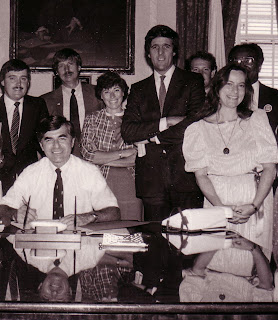Fraser Testifies before Department of Public
Utilities in Defense of Cape
Wind
Genevieve Fraser, a Democratic candidate for state
representative for the 2nd Franklin
District, recently testified before
the Department of Public Utilities in Boston
regarding the Cape
Wind project. Fraser, along with environmental
organizations such as the Sierra Club and the Environmental League of
Massachusetts, focused on the benefits of Cape Wind
versus the true cost of fossil fuels to the environment and public health,
Cape Wind is a 130 wind
turbine electrical generation project proposed for Horseshoe Shoal in Nantucket
Sound, miles from the nearest shore. It
is projected to produce up to 420 megawatts of clean, renewable energy which will
provide three quarters of the Cape and Islands
electricity needs.
Though
off-shore wind turbines are common in parts of Europe, if built, Cape Wind will
be America’s
first offshore wind farm.
“Though some regard natural gas
with its reduced CO2 content as the gold standard of fuels, they fail to
measure its true cost – the environmental catastrophe to aquifers caused by
fracking which can be likened to blowing up mountain tops to extract coal, or
putting our oceans’ flora and fauna at risk through deep water drilling,”
Fraser commented. “Gas, coal, oil are
all fossil fuels that generate global warming and climate change. Their toxins are dead matter, EXCESS carbon
exhumed from biomass created eons ago.
These toxins overload the atmosphere and cannot be successfully
recaptured – though we are stressing our forests to the max attempting to do
so.”
“Cape Wind,
however, offers hope of a cleaner, healthier world. The ocean’s wind currents, close to a land
base, can harness energy that can be captured without destroying forests and
farmlands so vitally needed for food and shelter and fiber-based products,”
Fraser continued. “Offshore wind
farms harness more frequent and powerful winds than are available to land-based
installations and have less visual impact.
By utilizing ocean borne wind energy -
working in tandem with solar, geothermal, hydro and sustainably harvested
biomass that recaptures its own gasses as it re-grows and regenerates itself as
part of the natural cycle of life – we are using natural resources native to
the atmosphere to help power our collective global civilizations.”
“The crisp, pollution-free,
off-shore Cape Wind, in conjunction with other
renewables, can be harnessed to create bio-based fuels for transport and
bio-based non-toxic products and chemicals that will produce jobs within the
manufacturing, farming and forestry industry.
This, in turn, will help foster clean air, clean water and soil, as well
as flourishing biodiversity amid flora and fauna as an overly mature forest is
sustainably harvested and put less at risk for disease and fire,”
Genevieve Fraser is a former
aide to retired state Senator Robert D. Wetmore and a recipient of a
Massachusetts Environmental Commendation for her work on an Acid Rain awareness
campaign.






